Some workplaces actively encourage employees to take breaks during the day as a way to re-charge, improve their wellbeing and their performance, as evidenced by the growing number meditation rooms, nap pods and ping pong tables, particularly in the technology sector. But do you know what type of break is most effective? A study which explored daily micro-breaks and job performance revealed some surprising findings which could help you to get the most out of your breaks.
What Types Of Micro-Breaks Are Most Effective?
Like many people, I find myself reaching for my smartphone when I want to take a break from work. I might scroll through twitter or a news website for a few minutes. The popular press is doing a pretty good job at making me feel guilty about my smartphone habit, but I’ve not found many evidence-based alternatives to suggest what I should be doing in my brief respites from work.
In 2015 a group of researchers set out to investigate the relationship between four different types of micro-breaks and job performance:
- Relaxation: A break to relieve psychological and physical tension.
- Socialising: Interacting with people.
- Cognitive: A mental break from work, still requiring some attention and effort.
- Nutrition: Snacking and drinking at work.
The study is interesting from an academic and practical perspective. While a significant amount of research has explored off-job recovery experiences and their positive outcomes (i.e. how we recover outside of work, and what benefits this has), relatively fewer studies have investigated ‘on-the-job recovery’.
Is It The Coffee Or The Conversation?
The data in the 2015 study were generated from twice daily surveys and sales performance results, over two working weeks, from a group of 71 employees. Surprisingly, while relaxation, socialisation and cognitive activities were positively related to increased positive mood and improved performance, micro-breaks for nutrition-intake, such as drinking a coffee, did not predict positive mood or job performance. After controlling for caffeine consumption and mood, the findings suggest that nutrition-intake breaks are effective because they often coincide with other break activities, such as socialisation. So the coffee doesn’t matter as much as the conversation.
Examples Of Effective Micro-Breaks
According to the paper, effective micro-breaks include:
Relaxation activities:
• Stretching
• Looking out the office windows
• Any other psychological relaxation (i.e. load decreases)
Socialising activities:
• Chatting with co-workers on non-work related topics
• Using instant messenger, or calling friends or family
• Texting
Cognitive activities:
• Reading books for personal learning
• Reading newspapers or magazines for entertainment
• Surfing the web for entertainment
The researchers even recommended giving employees free internet access, books, magazines, and newspapers so that they could take a mental break from work demands.

Why Work Engagement Matters
The study results also suggest that work engagement moderated the effects of micro-breaks on performance, via positive mood. Basically, the results indicate that, if you’re not feeling particularly interested or engaged with your work, boosting positive mood is an important predictor of work-performance as it plays a central role in motivation. Consequently, finding ways to increase positive mood (such as by taking a micro-break), is effective. However, if you already feel highly engaged and interested in what you’re doing, positive mood, and by extension micro-breaks, don’t matter so much; you are more likely to feel motivated and be able to get on with the job and perform.
Taking A Break Doesn’t Mean That You Can’t Do Anything
As is this case with a lot of workplace research, the results are quite intuitive. Micro-breaks are useful, especially if you aren’t feeling very motivated or engaged, and the most effective breaks include activities that help you to relax, interact with other people and detach from work, even if that does involve your smartphone. And for those of us who find it difficult to switch off and stop completely, I find the idea that taking a break doesn’t mean that I have to ‘do nothing’ quite liberating.
You can read more about recovery, and how to recharge inside and outside of work, in my previous articles on switching off and the science of the perfect nap.
References
Kim S, Park YA, Headrick L. Daily micro-breaks and job performance: General work engagement as a cross-level moderator. J Appl Psychol. 2018;103(7):772–86.









